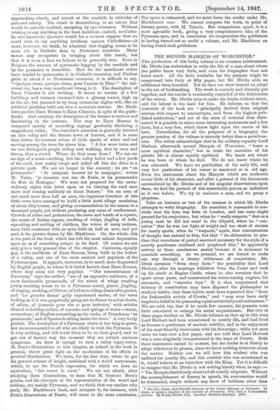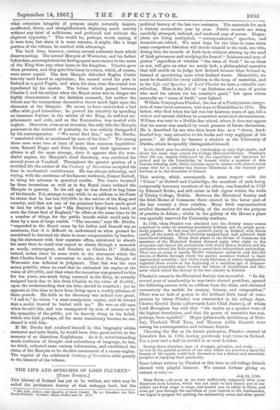THE SECOND MARQUIS OF WORCESTER.*
THE production of this bulky volume is no common achievement. Mr. Dircks has undertaken to write the life of a man about whom the public know very little, and even his biographer does not know much. All the facts available for the purpose might be compressed into forty or fifty pages, but Mr. Dircks adds an additional three hundred. Yet he does not show himself an adept in the art of bookmaking. The work is coarsely and clumsily put together, and the reader is continually reminded of the deficiencies of the writer. Mr. Dinka tries to make his bricks without straw, and the labour is too hard for him. He informs us that the materials of the book are " principally derived from original sources with respect to manuscripts, and from the highest pub- lished authorities," and out of the mass of material thus disin- terred it is possible to select some interesting statements and a few facts, but a very few, which throw light upon the career of his hero. Nevertheless, for all the purposes of a biography the greater portion of the volume is scarcely better than a peradven- ture. The writer acknowledges that in his military capacity Lord Herbert, afterwards second Marquis of Worcester, " bears a most mythical character," but in truth the narrative of his private life is almost equally mythical. We know not where he was born or where he died. We do not know where he was educated. We have no particulars of his early life, and very few particulars of his career in manhood or in old age. Even the statements about the Marquis which are authentic reveal little of his character, and after a perusal of the documents accumulated by Mr. Dircks and of his singular observations upon them, we find the portrait of this remarkable person as indistinct as it was before. We try to embrace a man, and we grasp a phantom.
Take an instance or two of the manner in which Mr. Dircks attempts to write biography. He considers it reasonable to con- clude that his hero was born in London, and has some slight ground for his conjecture; but when he " easily suspects " that as a young man he did not excel in the tiltyard, when he " con- ceives" that he was too light of weight and too short of stature for manly sports, when he "suspects," again, that concentration of thought was natural to him, but that " its elaboration to pro- duce that roundness of period assumed necessary for the style of a courtly gentleman confused and perplexed him," he apparently arrives at these conclusions merely because it is necessary to conclude something. As we proceed, we are forced to make our way through a dreary wilderness of conjectures. Mr. Direk surmises " from stray facts " the possibility that Lord Herbert, after his marriage withdrew from the Court and took up his abode at Raglan Castle, where he also surmises that he spent seven years, and constructed his water-raising engines, his automata, and " amusive toys." It is then conjectured that delicacy of constitution may have disposed the philosopher to studious habits, that these habits must have separated him " from the fashionable society of Courts," and " may even have early inspired a belief in his possessing equal eccentricity and enthusiasm." We are told, too, that if he made few enemies, his pursuits were little calculated to enlarge his social acquaintance. But two or three pages further on Mr. Dircks informs us that up to this time Lord Herbert had been accustomed to courtly life, and had lived as became a gentleman of ancient nobility, and in the enjoyment of the most friendly intercourse with his Sovereign ; while yet once more we turn over a few pages, and are told that Lord Herbert was a man singularly inexperienced in the ways of Courts. Both these statements cannot be correct, but the reader is at liberty to adopt whichever he pleases, since we know nothing whatever about the matter. Neither can we tell how this student who was unfitted for courtly life, and this courtier who was accustomed to it, would behave at an interview with the King. Yet it is difficult to imagine that Mr. Dircks is not writing history when he says:— "The Marquis fastidiously observed all courtly etiquette. Without the accomplishment of fluency in speech, his conversation would be deferential, simple without any show of boldness other than
• The Life, Times, and Scientific Labours of the Second Marquis of Wormier. To which is added a Reprint of his Century of Inventions, 1603, with a Commentary thereon. By Henry Dinka, Esq, London: Bernard Climatal. 1865.
what conscious integrity of purpose might naturally inspire, unaffected, direct, and straightforward, displaying much suavity without any taint of selfishness, and profound zeal without the slightest hypocrisy." This would be, perhaps, worth saying, if it were true, but since it is mere surmise, it might, like a large portion of the volume, be omitted with advantage.
The book does, however, contain several authentic facts which deserve noting. The second Marquis of Worcester, and his father beforehim, are conspicuous for having spent more money in the cause of the King than any other house in the kingdom. Charles gave them promises, and they gave him loans in return, which, of course, were never repaid. The first Marquis defended Raglan Castle bravely until forced to capitulate ; the second acted his part in Ireland as a good Papist, and when his aims were discovered was repudiated by his master. The letters which passed between Charles I. and his subject when the Royal cause was in danger are highly characteristic of the faithless monarch, but neither the letters nor the transactions themselves throw much light upon the character of the Marquis. He seems to have undertaken a bad office with good intentions ; he proved his sincerity by spending an immense fortune in the service of the Sing, he suffered im- prisonment and exile, and on the Restoration was treated with neglect. Moreover, even as an inventor, the only title the Marquis possesses to the interest of posterity, he was entirely disregarded by his contemporaries. " We never find him," says Mr. Dircks, " associated with or mentioned by men of his time." Yet among those men were two at least of more than common inquisitive- ness, Samuel Pepys and John Evelyn, and their ignorance or silence is all the more strange, since it appears that the won- derful engine, the Marquis's chief discovery, was exhibited for several years at Vauxhall. Throughout the greater portion of a troubled life the author of the Century of Inventions occupied his time in mechanical contrivances. He was always scheming, and trying, with the assistance of his famous workman, Caspar Kaltoff, to bring his schemes to practical results. The losses incurred by these inventions as well as in the Royal cause reduced the Marquis to poverty. In his old age he was forced to beg loans of his friends. Yet, strange to say, while in an address to his Peers he states that he has lost 918,0001. in the service of his King and country, and that not one of the promises have been made good to him for which he had " His Majesty's Royal word, hand, or even the Great Seal of England," he offers at the same time to do a number of things for the public benefit which could only be done by a man of large wealth. " The 'amount," says Mr. Dircks, "expended in the Royal cause by his father and himself was so enormous, that it is difficult to understand on what ground he considered he bettered his claim to some compensation by burden- ing his statement with four separate offers, calculated to absorb far more than he could ever expect to obtain through a monarch so needy, extravagant, and dissolute as Charles II." Difficult indeed, unless there be some truth in the statement which the first Charles found it convenient to make, that the Marquis of Worcester was deficient in judgment. That this was the case seems possible, when we read that he estimated his engine at the value of 400,0001., and that when the invention was granted to him for ten years, one-tenth being reserved to the King, he actually resigned lands due to him from Charles to the value of 40,0001., upon the understanding that the tithe should be remitted ; yet he appears at this time to have been living upon a weekly pittance of three pounds. His faith in his discovery was indeed very great. "I call it," he writes "a semi-omnipotent engine, and do intend that a model thereof be buried with me." He was an old man when he said this, and was unsupported by men of science or by the sympathy of the public, yet he bravely clung to his belief, which was held, perhaps, all the more tenaciously because no one shared it with him.
If Mr. Dircks had confined himself in this biography within narrower and safer limits, he would have done good service to the memory of an illustrious Englishman. As it is, notwithstanding much confusion of thought and redundancy of language, ho has, we think, collected some carious information, and established the claim of the Marquis to be the first constructor of a steam-engine. The reprint of the celebrated Century of inventions adds greatly to the interest of the volume.































 Previous page
Previous page